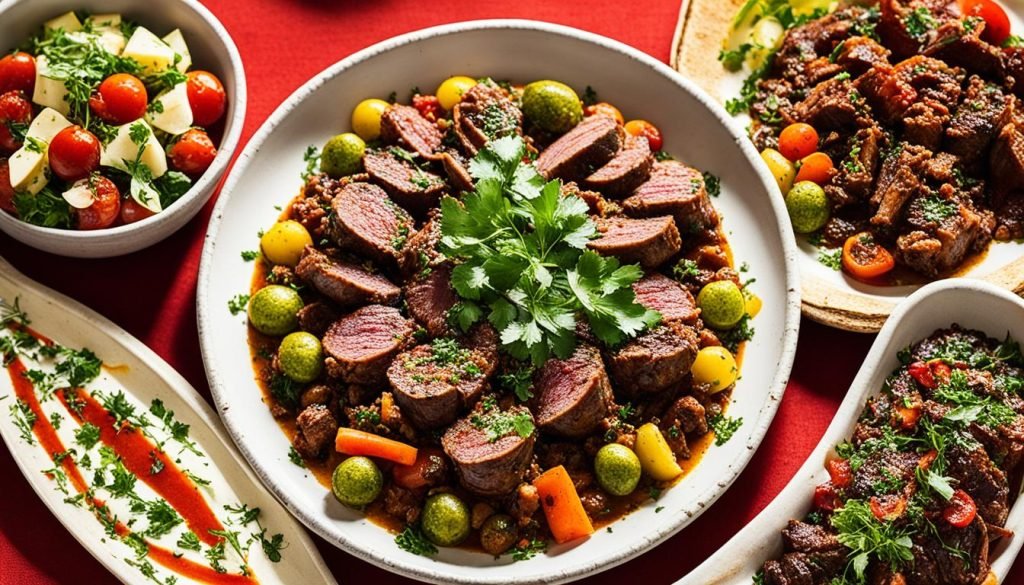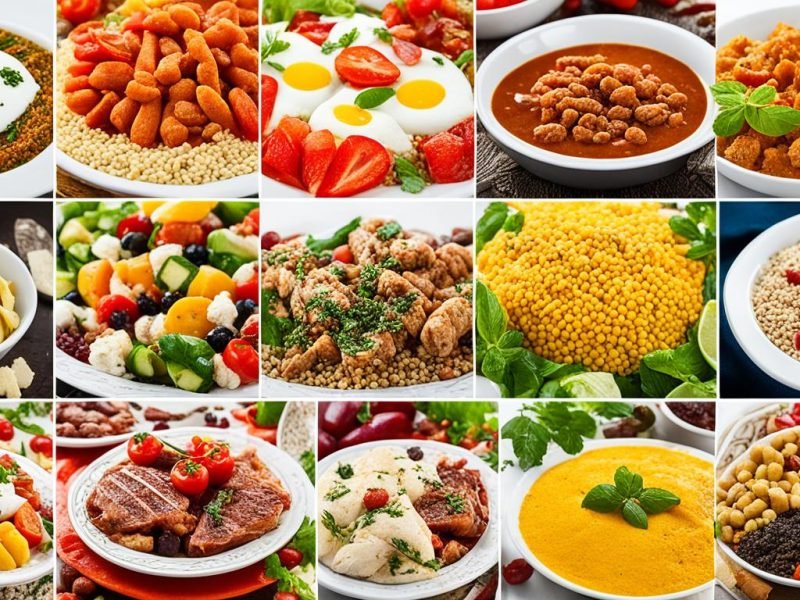My journeys have taken me to the colourful coasts of the Mediterranean and bustling North African markets. I’ve come to love how food shapes cultures. It opens doors to the soul of a nation. Tunisia is unique in this regard. Its Islamic dietary rules and rich history shape its cuisine. These norms make Tunisian food diverse and deeply rooted in faith.
In many Western countries, pork is a favourite. But in Tunisia, it’s a different story due to religious beliefs. The land’s faith impacts not just spirit but food too. So, pork is not common in Tunisia. This shows the importance of tradition and respect in the local cuisine.
Tunisian dishes have told me stories. They speak of rich lamb stews, spiced beef, and fresh fish from the Mediterranean. Yet, there’s a noticeable absence. Pork isn’t part of their diet because of Islamic laws. It’s the silence among a variety of flavours.
Key Takeaways
- Islamic dietary laws shape the food culture in Tunisia, predominantly excluding pork.
- Tunisian dietary restrictions reflect the fusion of Mediterranean and North African culinary arts within a halal framework.
- Exploring pork availability in Tunisia offers insights into how tradition and religious beliefs loom large over contemporary dining practices.
- Understanding the nation’s culinary narrative involves appreciating the absence of pork as much as the indulgence in other traditional proteins.
- The richness of Tunisian cuisine can be found in its grains, lamb, beef, and seafood that align with the dietary preferences of the majority.
Understanding Tunisian Food Culture and Dietary Restrictions
Tunisian food culture is rich with tradition and follows strict halal food rules. Religion impacts what people eat, making the cuisine uniquely Tunisian. Let’s explore how history and modern ways shape traditional Tunisian food. This ensures each meal is authentic.
The Influence of Religion on Cuisine
In Tunisia, religion shapes all aspects of life, including cooking. The cuisine has many dishes made according to Islamic laws. It uses lots of grains and meats but no pork. This shows how faith influences the Tunisian diet.
The Prominence of Halal Food Regulations in Tunisia
Tunisians have followed halal food rules for generations. This isn’t just about religion. It’s about how food is chosen, made, and served. These old traditions keep Tunisian halal customs strong. They make the food not just respected by locals but also admired by visitors.
- Grains as the foundation of meals
- Diverse meats such as lamb, beef, and poultry sourced and prepared under halal guidelines
- Exclusion of pork from the diet in alignment with Islamic teachings
- A vibrant array of spices that bring out North African flavours
You see how closely these traditions are kept. Every meal is not just delicious but also honors a culture. Tunisians are very proud of this heritage.
Exploring the Culinary Landscape of Tunisia
I’m discovering the heart of Tunisian food, a mix of tastes and textures from traditional Tunisian cuisine. It mirrors Tunisian dietary restrictions and Tunisian food laws. It shows the country’s culture and history. Popular dishes include couscous, tajine, and harissa, all key to Tunisia’s food scene.
Tunisian food also has Italian and French influences. The core of its taste comes from local products like wheat, olive oil, and seafood. Spices like cumin, coriander, and caraway make their dishes unique.
Tunisia’s food journey is as old as its past. It honors religious food rules while celebrating its varied crops.
- Couscous: The essential Tunisian dish, versatile and comforting.
- Tajine: Different from Moroccan stew, this is like a baked egg and meat dish, similar to quiche.
- Harissa: A hot chili paste that adds spice and flavour to Tunisian meals.
We’re looking at some famous Tunisian dishes and what makes them special.
| Dish | Main Ingredients | Characterising Spices |
|---|---|---|
| Couscous | Wheat semolina, lamb, vegetables | Ras el hanout, saffron |
| Tajine | Eggs, cheese, minced meat | Mint, parsley |
| Harissa | Chili peppers, garlic, olive oil | Coriander, caraway |
Tunisian food laws highlight halal practices, showing both religious and cultural respect. I find it captivating to learn about a cuisine that has lasted centuries. It still brings new tastes to the table.
The Traditional Meats of Tunisian Cuisine
In Tunisia, the love for lamb and beef runs deep. They are not just tasty. They also meet halal rules. These meats showcase Tunisia’s warm essence, starring in many daily meals.
Lamb and Beef in Everyday Dishes
Lamb stands tall in Tunisian cuisine, woven into recipes that echo the nation’s rich food heritage. Its presence in slow-cooked stews and spiced kebabs marks joy and comfort. Beef, on the other hand, is also cherished. It forms the foundation of many warm, comforting dishes handed down through time.

The Role of Seafood Along the Tunisian Coast
Tunisian seafood also plays a key role, especially along the Mediterranean coast. It offers a lighter but no less tasty choice. More than food, seafood is a way of life here. The daily catch is eagerly awaited and served with traditional flair.
| Meat | Dish Examples | Culinary Influence |
|---|---|---|
| Lamb | Mloukhia, Tunisian Lamb Tagine | Central to celebrations; often paired with couscous |
| Beef | Kafsah, Beef Brik | Staple meat for everyday meals; versatile in preparation |
| Seafood | Grilled Tuna, Seafood Couscous | Indicative of coastal culture; fresh flavours that reflect the Mediterranean |
Exploring Tunisian food is always exciting. From tender lamb and strong beef to fresh seafood, each dish shares tales of the land and its people.
Searching for Pork: Is It Available in Tunisia?
I love exploring different cultures through their food. I’ve noticed that in Tunisia, finding pork is quite rare. This is because Islamic laws strongly influence what people eat there, making pork very uncommon.
Pork is pretty hard to find in Tunisia’s cuisine. In the bustling markets of Tunis, it’s almost absent. This absence is due to a long tradition of following halal practices. As a result, pork dishes are virtually non-existent.
In many Western countries, pork is enjoyed in many forms. However, in Tunisia, it’s not common. Instead, Tunisians enjoy lamb tagines, seafood, and legumes. Even international food places in Tunisia don’t serve pork, sticking to halal meat instead.
So, can you find pork anywhere in Tunisia? My research shows that some international hotels and places for expats might have it. But, these are rare exceptions and don’t reflect Tunisian food culture overall.
Pork’s rareness in Tunisia shows how much religion and culture influence what people eat.
- Pork is rarely in traditional Tunisian meals.
- Halal practices guide meat eating habits.
- Pork dishes are scarce in Tunisia’s mainstream food scene.
- You might find pork in some international hotels.
For those looking for pork in Tunisia, it’s important to know about the country’s food customs. Tunisia’s culinary scene shows deep respect for its religious beliefs, which affects pork availability. In Tunisia, halal choices are everywhere, making pork quite an unusual find.
Italian and French Influence on Tunisian Food Customs
Tunisian cuisine usually doesn’t include pork due to religious rules. Yet, Italian influence on Tunisian cuisine is quite strong in other areas. You’ll find many dishes with pasta and tomato-rich sauces, showing Italy’s impact. All over Tunisia, from restaurants to homes, the Italian heritage is clear in their daily meals.
The French influence on Tunisian food can be seen in pastries and breads. Tunisian chefs have mastered French pastry and baking methods, fitting them into halal guidelines. This brings French-style baguettes, croissants, and other pastries alongside Tunisian Mlawi and Tabouna. It’s a wonderful mix in Tunisia’s food scene.
- Reimagining of Pasta Dishes: Melding Tunisian spices with Italian pasta to create distinctive blends that pay homage to both culinary realms.
- Adaption of French Patisserie: Integrating local ingredients such as dates and almonds into classic French desserts.
- Preservation of Halal Dining: Despite foreign influences, Tunisian cuisine remains committed to halal preparation methods and ingredients.
Overall, the beauty of Tunisian food is in blending Italian and French cooking styles without using pork. This mix of local and foreign tastes makes Tunisia’s food unique. It’s a perfect example of how cultures meet and merge in the kitchen, enriching Tunisia’s culinary identity.
Halal Certification and Its Impact on Pork Availability
In Tunisia, halal certification shows how views on halal foods change with generation. This has a big impact on what food gets sold, especially pork. As someone watching market trends, I see how these rules start interesting talks. These talks show different opinions within Tunisian communities.
Halal certification in Tunisia is not just about food; it’s a testament to cultural identity and changing generational values.
The Perception of Halal Amongst Different Generations in Tunisia
Looking at how different ages view halal foods, there’s a clear change. Tunisian youth, influenced by worldwide trends and growing religious understanding, push for more strict rules. This is different from older people’s views, which are more flexible. This difference tells us a lot about the role of halal in society and culture.
International Trends and Local Responses
Worldwide trends have a big impact on local customs, including in Tunisia. The need for halal food increases because of global demand. This makes local businesses and customers aim for higher halal standards. These changes respect Tunisia’s own culture while responding to global influences.

- Stricter halal adherence among the young
- Influence of international halal standards
- Resilience of Tunisian cultural identity
The story of halal certification in Tunisia is more than about food. It connects deeply to the country’s identity. This story, shaped by voices from all generations, is leading the food industry. It shows how old values and new ways can work together.
| Generation | Attitude towards Halal | Influence on Pork Availability |
|---|---|---|
| Youth | High demand for strict certification | Decreased availability |
| Elderly | Mix of traditional and relaxed views | Moderately affected |
| Overall Trend | Preference for certified halal products | Limited options for pork |
Tunisian Cuisine and Pork: A Look at Legal and Culinary Norms
I’m always curious about how laws affect national dishes. In Tunisia, the mix of Tunisian food laws and Islamic dietary laws is intriguing and important. These laws decide what’s okay to eat. They make sure traditional Tunisian meals follow Tunisian dietary restrictions.
In looking at these norms, one sees a mix of tradition respect and religious rule following. For those observing it, Islam shapes their food choices with Halal needs. This mix of law, culture, and food makes Tunisia’s food scene very special.
Tunisian cooks are skilled in making dishes that follow and praise their heritage and religious food rules.
Here’s how Tunisian food compares with the use of pork:
| Halal-Certified Ingredients | Non-Halal Ingredient (Pork) |
|---|---|
| Fruits and vegetables | Prohibited in Tunisian cuisine |
| Lamb, beef, and poultry | Not served because of Islamic dietary laws |
| Seafood | Not used due to Tunisian food laws |
| Grains and legumes | Left out following Tunisian dietary restrictions |
Looking at Tunisia’s take on pork shows us about its culture and how law and food work together. The country’s dishes show a strong link to diet rules passed down through times, like their stories and rituals.
To conclude, Tunisia’s food, without pork, shows more than a choice. It shows a culture built on strict followings of Islamic teachings. Diving into Tunisian cuisine, the rules, spices, and methods show a deep connection. They weave together the rich pattern of Tunisian food.
The Diversity of Tunisian Gastronomy Beyond Pork
I’m thrilled to find Tunisian food isn’t just about pork. It offers amazing vegetarian dishes in Tunisia and plenty of seafood in Tunisian cuisine. This North African country’s rich culture and varied landscapes bring us a feast of flavours. These dishes showcase the true variety in its food.
Vegetarian and Seafood Alternatives
Vegetarians will love Lablabi, a spicy chickpea soup, and Shakshouka. Shakshouka features eggs in a tomato, chilli, and onion sauce. Both dishes show how Tunisia uses its local veggies. For seafood lovers, there’s Brik à l’œuf de poisson. It’s a crispy pastry packed with tuna and capers, celebrating the Mediterranean Sea’s gifts.
Regional Specialities Across Tunisia
Every part of Tunisia offers unique tastes. In Sfax, people enjoy special seafood thanks to its seas. The northwest’s capers and olives turn into delicious sauces and stews. Meanwhile, the south’s dates sweeten desserts and snacks alike.
| Region | Speciality Dish | Main Ingredients |
|---|---|---|
| Coastal Sfax | Grilled Sea Bream | Sea bream, olive oil, lemon |
| Northwest Cap Bon | Mloukhiya | Mloukhiya leaves, garlic, beef |
| Southern Djerba | Massfouf | Couscous, dates, nuts |
Exploring Tunisian dishes has opened my eyes to a world beyond pork. The savoury stews and aromatic grains of regional Tunisian specialities invite everyone. They make me eager for more. This journey into Tunisian food proves its wide appeal, satisfying all food lovers.
Conclusion
Tunisian cuisine is a mix of Mediterranean flair and North African roots. It’s more than just avoiding pork. It mirrors a rich history and culture, following Islamic food laws. This cuisine offers a feast of spicy meats, fresh seafood, and lots of veggies. It’s a memorable experience for everyone.
The flavours in Tunisia tell a story. They speak of the country’s beliefs and values. You’ll find bustling markets full of spices and coastal spots with the freshest seafood. This creates Tunisia’s lively food scene. Every dish is a genuine taste of the nation’s diverse culture.
Looking at Tunisia’s food, it’s clear it shows their identity and unity. The menu, sticking to halal and mixing ingredients carefully, shows a nation living in harmony. For food lovers looking for something new, Tunisia offers a rich culinary adventure. It’s a journey into its unique and rich food heritage.







